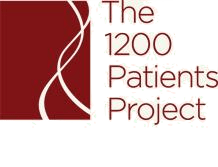The 1200 Patients Project
The 1200 Patients Project aims to develop a new model for personalized medical care through preemptive pharmacogenomics.
Enrolled patients provide a single blood sample for analysis, which is genotyped by an in-house CLIA-certified laboratory. Patients’ genetic information is compared to a database of well-substantiated pharmacogenomic research compiled by the 1200 Patients Project team, which is constantly updated to reflect the most current research available. This database is used to determine whether it is likely that a patient will respond positively or negatively to a medication.

1200+ Patients, We Care About Them All
Adverse reactions to medications are one of the leading causes of death in the United States and many patients take medications that are not effective for them. The information distributed to providers in this study could allow them to identify which patients would experience negative side effects from medications, and to determine which medications would be the most effective for each patient. Pharmacogenomic information can also be factored into dosing algorithms, so that the ideal dose for each patient can be most accurately determined, eliminating the trial-and-error process that is frequently required.
Read Paper
View Clinical Trial

Care since 2011
The center initiated its first clinical study in 2011 known as the 1200 Patients Project. This trial involved outpatients from various medical fields who underwent proactive pharmacogenomic testing to guide their future prescription treatments.
Pharmacological Web Portal (GPS)
Our dedicated team maintains an up-to-date and comprehensive database of well-substantiated pharmacogenomic research, continuously incorporating the latest findings. This valuable database allows us to assess how a patient’s genetic information aligns with known pharmacogenomic markers, determining the likelihood of a positive or negative response to specific medications.
With patient permission, these results are delivered to enrolled physicians at the University of Chicago through an online portal, termed the Genomic Prescribing System (GPS). The GPS is designed to be convenient to use, with clear and consistent images and wording, so that pharmacogenomic information can be easily integrated into clinicians’ workflow. Ultimately, the GPS enables physicians to make patient-specific treatment decisions, improving patient outcomes.
Featured in Publications
To delve deeper into our pioneering research and the impact it has on personalized medical care, we invite you to explore our publications. Our work is published on Clinical Pharmacology & Therapeutics and ClinicalTrials.gov. These publications serve as a testament to our dedication to advancing the field of pharmacogenomics and transforming the way healthcare is delivered.
Together, We Can Revolutionize Precision Health Care.
Enroll in our Study
Since 2011, the 1200 Patients Project has been recruiting patients for personalized pharmacological trial. Patients are recruited from physician referral. If you would like to enroll in The 1200 Patients Project, please talk to your physician or reach out to us by email.
Enage as a Physician
Interested in participating or have questions about how the 1200 Patient Project can transform your practice? Talk to the project leaders in our groundbreaking clinical trial, and be at the forefront of personalized medical care through preemptive pharmacogenomics.
Additional Inquiry
Discover the forefront of personalized medical care and pharmaco-genomics by delving into our publications. Have questions about our research or how it can benefit you? Reach out to us via email to learn more about the forefront initiatives.
Join us on this exciting journey of improving patient safety, efficacy, and overall well-being through personalized medicine.
Phone
(773)-753-1200
Open Hours
Mon – Fri: 9:00 AM – 4PM
Address
5841 South Maryland Avenue, MC 2115
